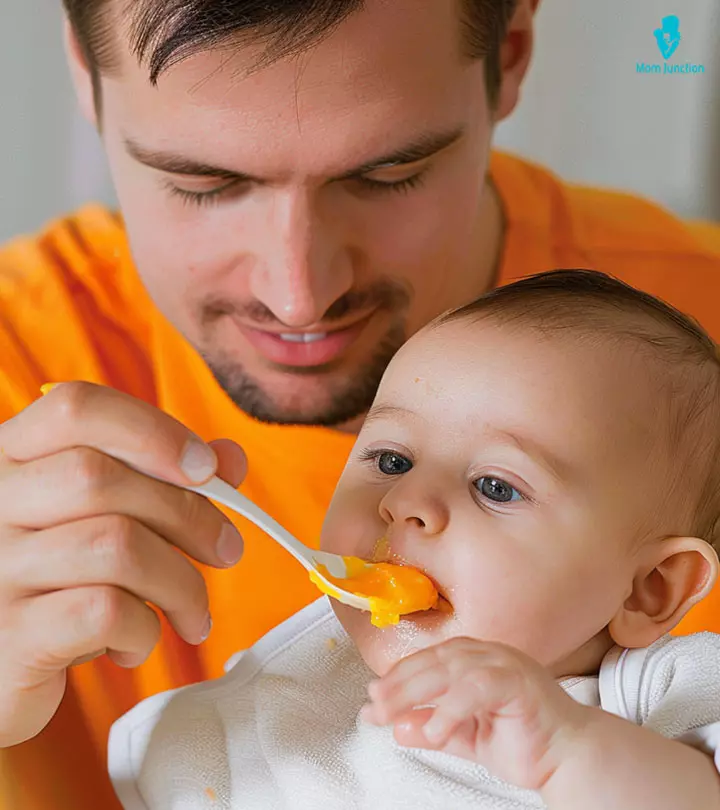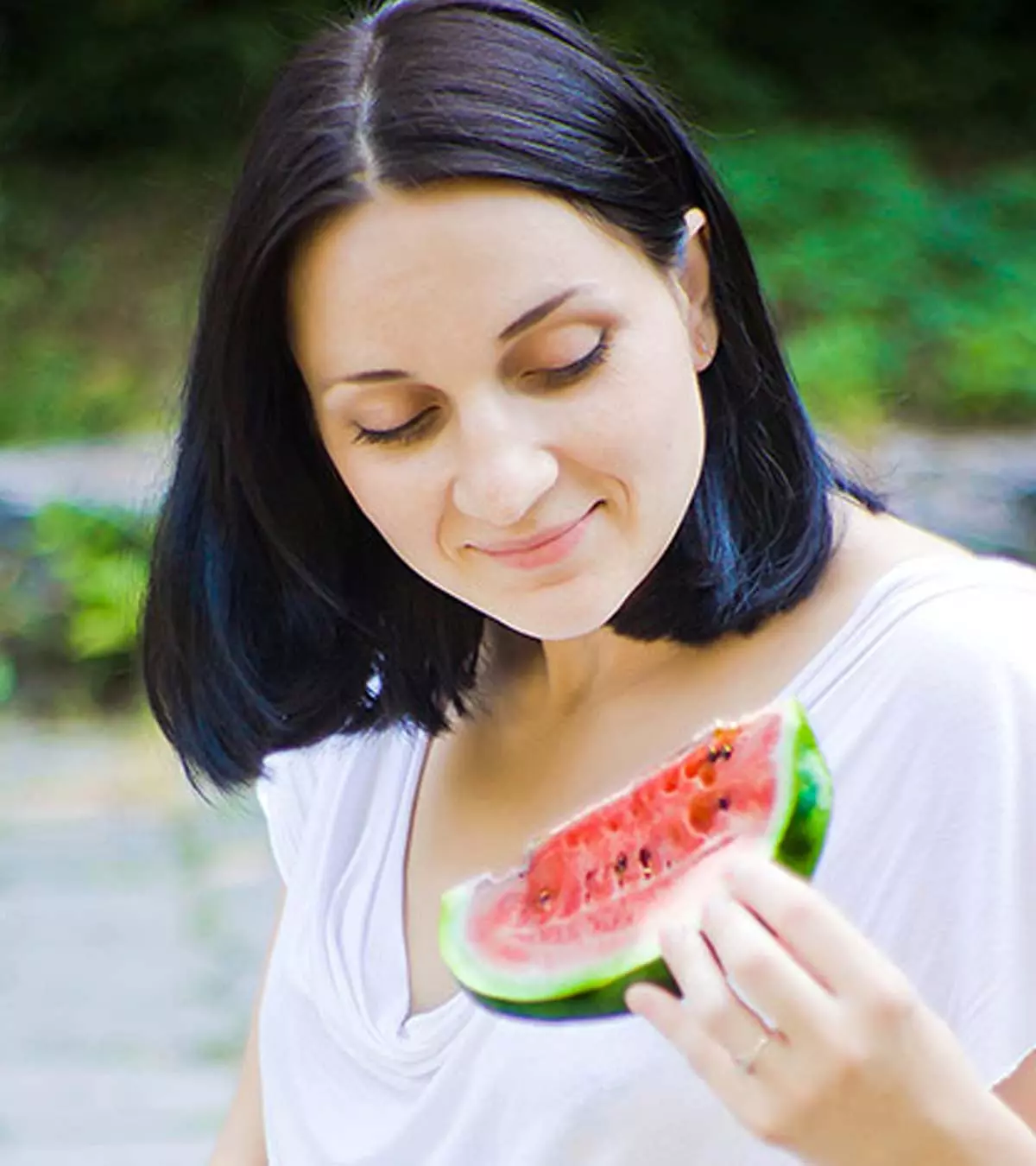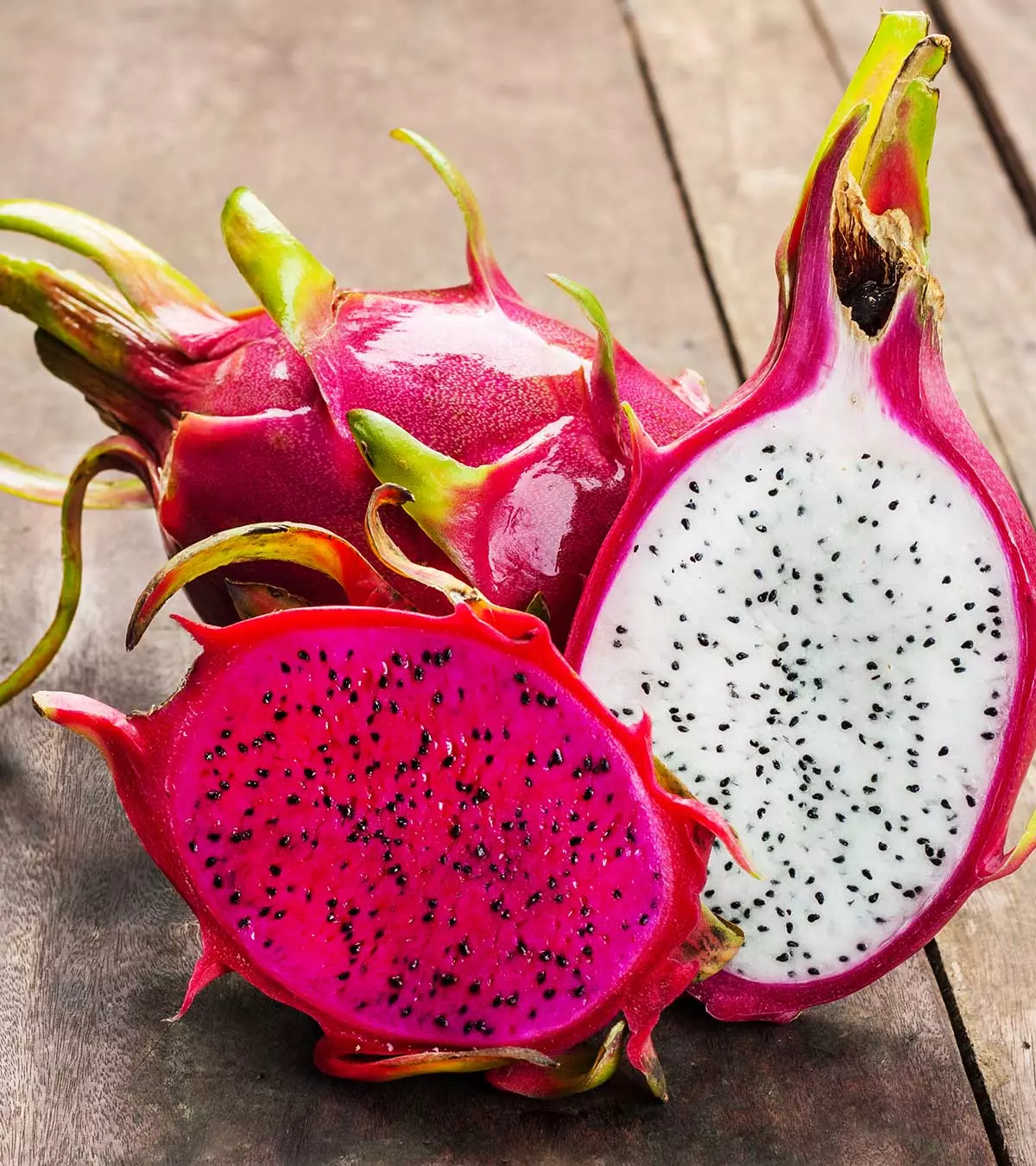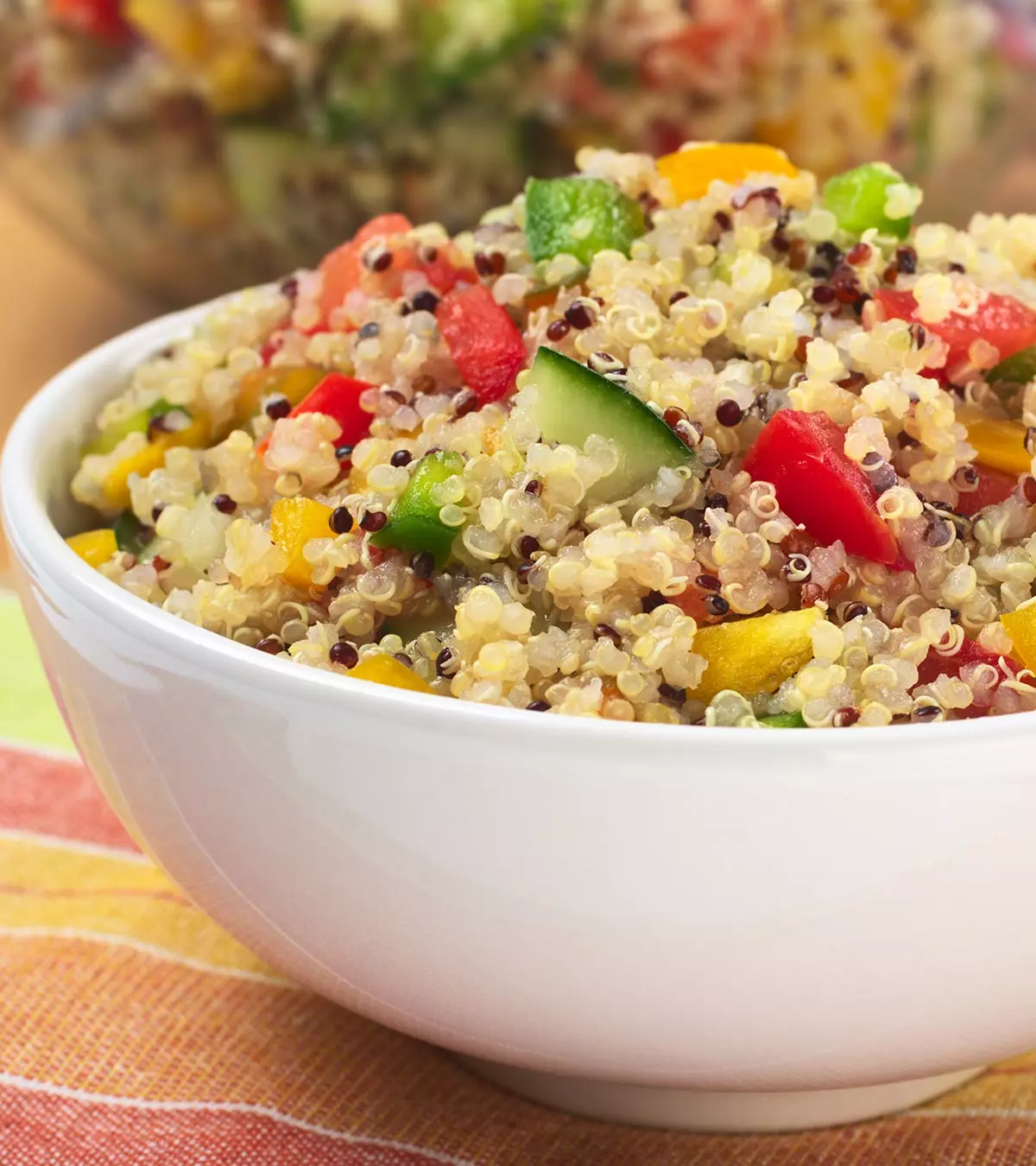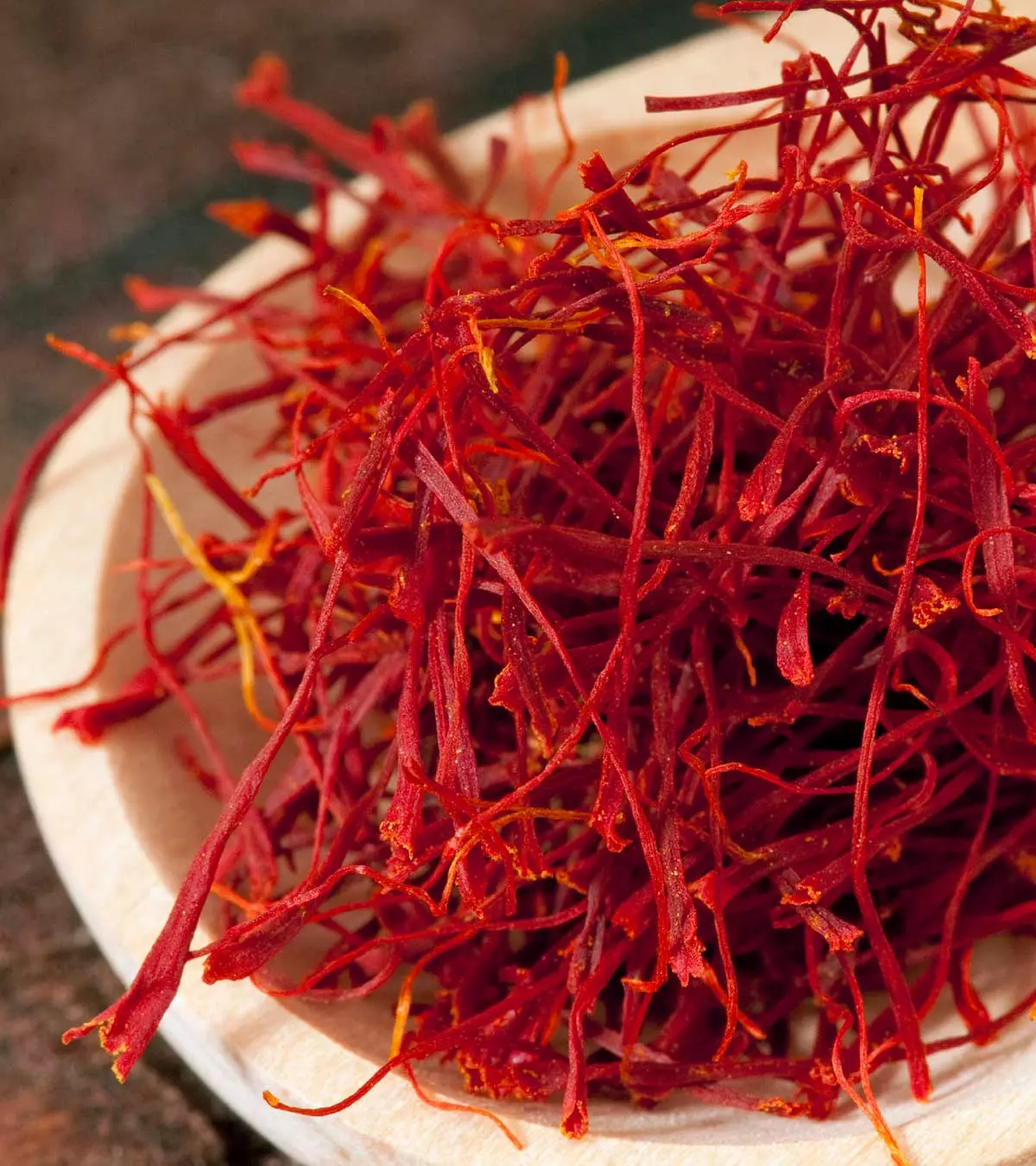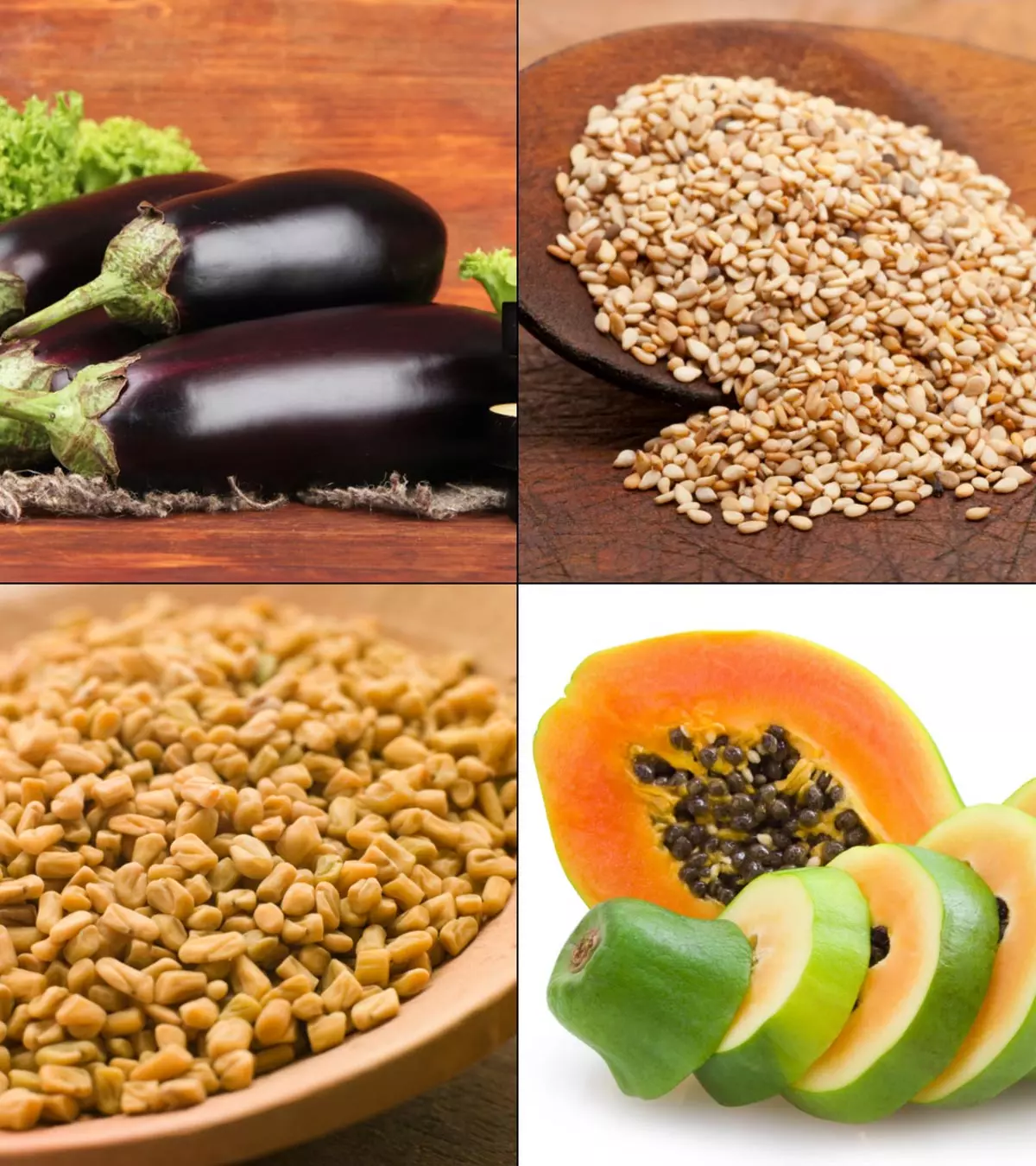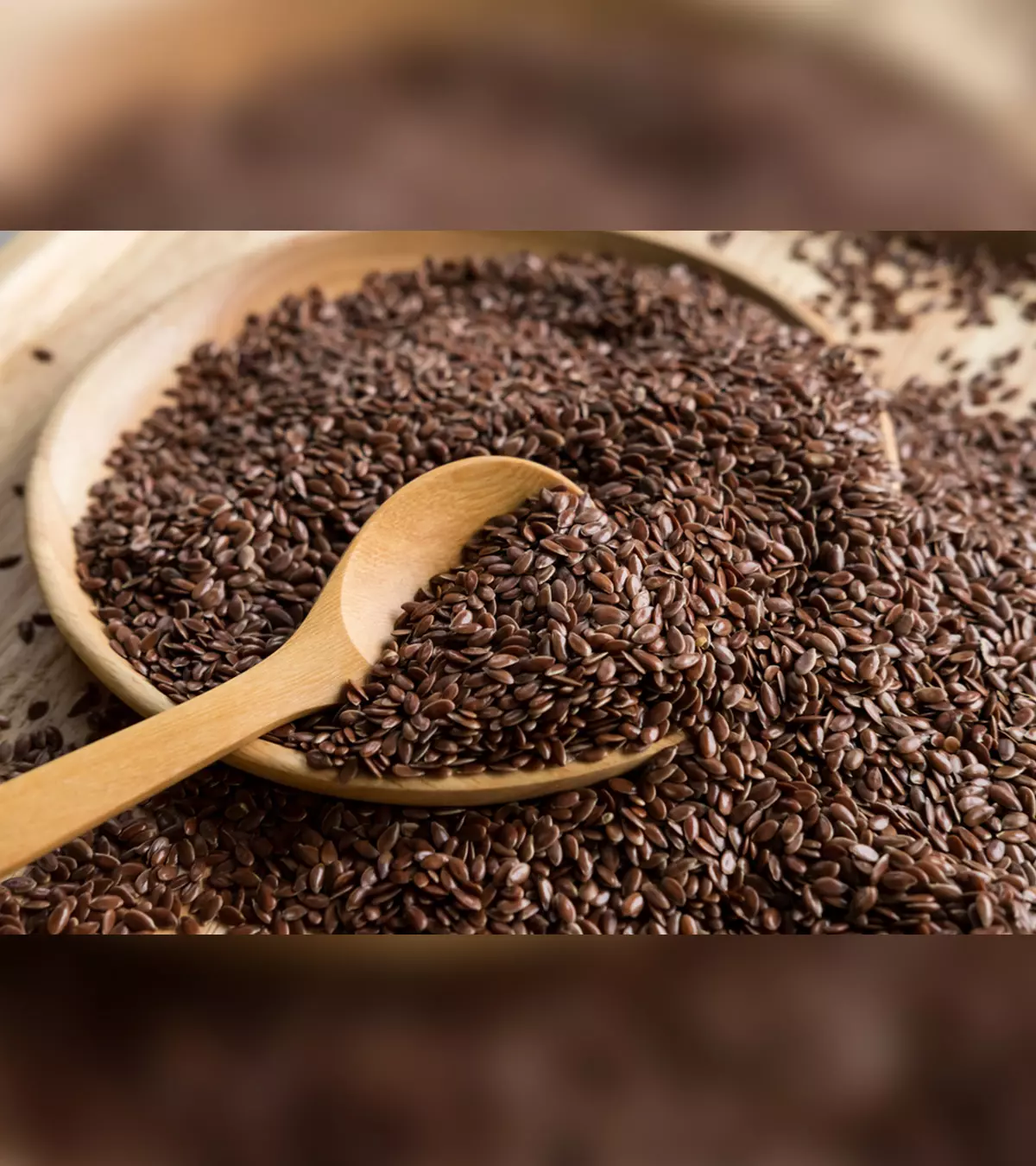
Image: Shutterstock
Artificial sweeteners are a popular alternative to natural sugar. However, as the name suggests, it is an artificial product. Hence, it must be analyzed how safe it is to consume artificial sweeteners in pregnancy.
Sugar is a major energy source. However, excess sugar consumption may increase the risk of certain health problems such as diabetes. Women with pre-existing diabetes may have to consider artificial sweeteners. Read this article to learn about the types of safe artificial sweeteners to use in pregnancy, their benefits, and their side effects.
Key Pointers
- Artificial sweeteners are safe to consume moderately during pregnancy.
- Sucralose, aspartame, acesulfame potassium, and sorbitol are safe to consume, whereas saccharin, neotame, and thaumatin should be avoided.
- They hardly carry any calories, help manage gestational diabetes, and prevent tooth decay.
- When consumed excessively during pregnancy, there could be side effects such as accumulation of saccharin in fetal tissue, headache, dizziness, and weight gain.
Understanding Artificial Sweeteners
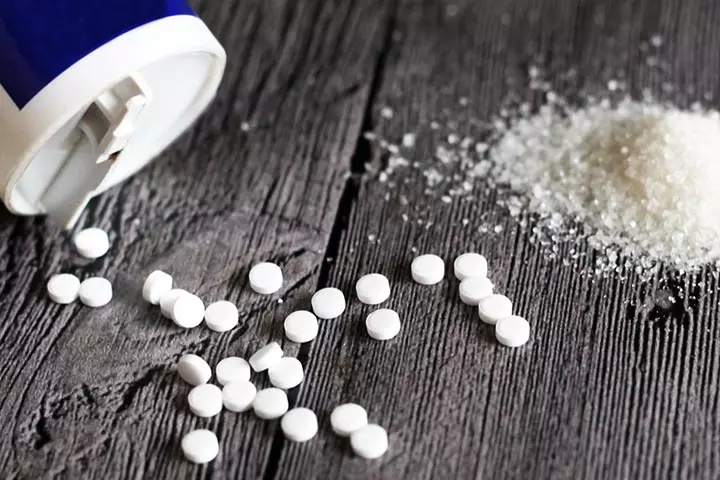
Artificial sweeteners are substitutes for regular sugar (sucrose). They are synthetic sugar substitutes derived from either herbs or natural sugars. They can be nutritive (have calories) or non-nutritive (have no calories) sweeteners (1).
Nutritive sweeteners add calories to your diet and contain very few minerals or vitamins. They are safe when used in moderation, as long as they do not contribute to weight gain. But if you develop conditions such as diabetes mellitusiA condition in which the body is unable to utilize glucose, leading to its increase in the blood. , insulin resistance or gestational diabetesiA condition characterized by elevated blood sugar levels due to hormonal and physical changes in pregnancy. , you may have to limit their consumption.
Sucrose, fructose, maltose, dextrose, corn sugar, and honey are nutritive sweeteners. Sugar alcohols, such as sorbitol, mannitol, isomalt and xylitol and hydrogenated starch, are also nutritive sweeteners. They are technically not sugars and are converted into fats in the body.
Non-nutritive sweeteners are added in minimal amounts for sweetening the dish. They are approved for use in reduced calorie and dietetic foods. Stevia, aspartame, sucralose, and saccharin are some.
Some of the FDA approved sweeteners for use in food include (2):
- Aspartame (Equal, NutraSweet) – Nutritive
- Saccharin (SugarTwin, Sweet’n Low) – Non-nutritive
- Acesulfame potassium (Sunett, Sweet One) – Non-nutritive
- Neotame – Non-nutritive
- Sucralose (Splenda) – Non-nutritive
Is It Safe To Use Artificial Sweeteners During Pregnancy?
Yes, artificial sweeteners approved by the US Food and Drug Administration (FDA) are safe, when used in moderation. You should consume them within the acceptable daily intake (ADI), to prevent them from becoming empty calories that replace nutrients required for a healthy pregnancy (3).
Recommended Intake Of Artificial Sweeteners When Pregnant
According to the FDA guidelines, you should limit your use of artificial sweeteners to two to three servings per day.
One serving equals one packet of sweetener or a 12oz can of diet soda (4). Overconsumption of artificial sweeteners can lead to excess weight gain.
Sometimes, based on your individual health circumstances, your doctor may make recommendations pertaining to the use of artificial sweeteners during pregnancy.
When Will Your Doctor Recommend The Artificial Sweeteners In Pregnancy?
Your doctor is likely to recommend artificial sweeteners for the following reasons:
- To control weight gain: Weight gain is normal during pregnancy. On an average, you can gain between eight and 16 kilos based on your BMI (4). But if you are gaining more than this, you might require artificial sweeteners to cut down on the calories. Artificial sweeteners have fewer calories when compared to table sugar (16 calories per teaspoon) but should be consumed in moderation (5). They cannot be considered a short cut to lose weight.
- To manage gestational diabetes: Artificial sweeteners are the best replacements to sugar if you have diabetes. They do not aggravate blood sugar levels or insulin during pregnancy unlike regular sugar does (6).
That said, not all sweeteners are safe to use, and it’s important to consider their impact on maternal health and nutrition. Next, we give you a list of sweeteners you can use and cannot use during pregnancy.
Artificial Sweeteners Safe For Use During Pregnancy
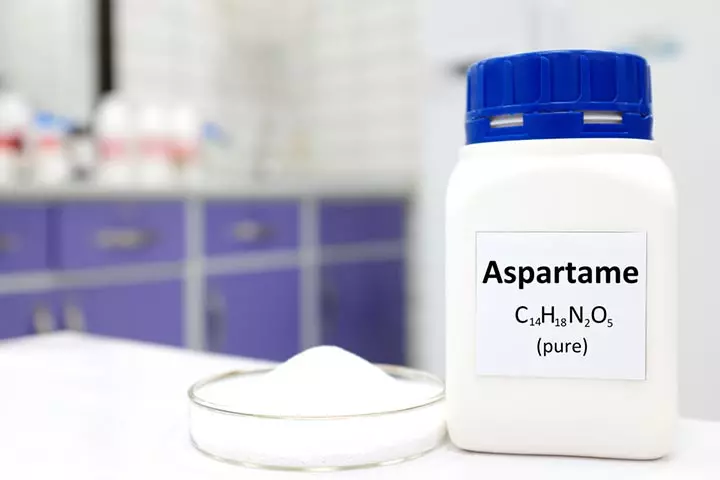
- Sucralose (Splenda®): It is a non-caloric sweetener made from sugar and approved by the FDA. It is approved for use in a variety of foods ranging from baked foods, fruit juices, baking mixes, non-alcoholic beverages, confectioneries, coffee and tea products, sauces, syrups, toppings and more. It does not affect your blood sugar levels and is safe for consumption during pregnancy (7).
- Aspartame (Equal®, NutraSweet® or Sugar Twin®): It is a low-calorie sweetener approved by the FDA. It is usually found in soft drinks, breakfast cereals, dairy products, pudding mixes, desserts, chewing gum and certain drugs. It is around 200 times sweeter than regular sugar and is safe for consumption during pregnancy. However, you should avoid this sweetener if you have phenylketonuria (PKU), a condition in which you have high phenylalanine (a component of aspartame) levels in the blood (7).
- Acesulfame Potassium (Sunett® or Sweet One®): It is a non-caloric sweetener approved by FDA for use in foods. It is added to baked foods, sugar-free gelatins, frozen desserts, puddings and soft drinks. It is 200 times sweeter than regular sugar and is safe for consumption during pregnancy (4).
- Sorbitol: It is a nutritive sweetener and sugar alcohol. It is used as a sweetener in candies, puddings, chewing gum, cookies and ice creams. It is 60% as sweet as regular table sugar and is safe for consumption during pregnancy. It shows no effects on the fetus, but too much of it can cause unpleasant gastro effects such as diarrhea and upset stomach. Consume it moderately, as excess consumption can also lead to pregnancy weight gain (8).
- Mannitol: Like sorbitol, mannitol is a sugar alcohol and can be consumed in moderate amounts during pregnancy. Large doses might lead to gas, bloating, diarrhea and cramping (4).
- Xylitol: This is another sugar alcohol, and is naturally present in many fruits and vegetables. It is used in candies, chewing gum, toothpaste and other foods. It is as sweet as natural sugar and is considered safe for consumption during pregnancy. It is known to reduce the accumulation of plaque on the teeth, and thus prevents tooth decay (9).
 Expert says
Expert saysArtificial Sweeteners Unsafe For Use During Pregnancy
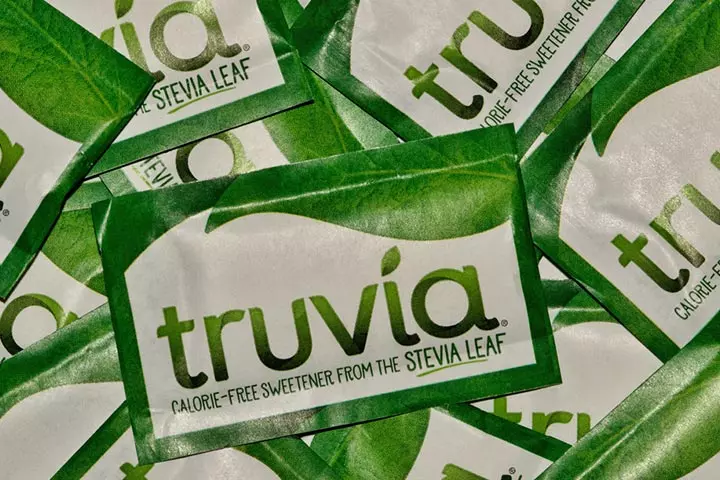
- Saccharin (Sweet and Low®, Sweet’N Low®, Necta Sweet® and Sweet Twin®): It is a non-caloric sweetener, but is not as popular anymore. The FDA does not approve it as it is known to increase the risk of bladder cancer. Studies also indicate that it can cross the placenta and accumulate in fetal tissues, but there is no evidence showing it is harmful to the baby (10).
- Rebaudioside A (Stevia®): It is obtained from parts of the plant native to South America, and is technically not approved by FDA. However, it is identified under GRAS (generally recognized as safe) by the FDA and is only sold as a dietary supplement rather than a sweetener. There is no clear research proving its safety, and therefore cannot be considered safe for consumption during pregnancy (11).
 Quick fact
Quick fact- Cyclamate: This is a non-nutritive sweetener and about 30 times sweeter than sugar. It is banned for consumption in the US, and there is not enough data regarding its safety for use during pregnancy (11).
- Thaumatin: is a sweet protein derived from the bush called Thaumatococcus daniellii, native to West Africa. It has a GRAS status and is used as a food additive and flavor enhancer. However, there is very little evidence of it being safe for consumption during pregnancy (3).
- Neotame: It is another artificial sweetener, flavor enhancer, and a chemical derivative of aspartame. It is known to be toxic as it is a breakdown of three components including phenylalanineiA crucial amino acid found in breast milk and certain foods and aid in various mental and physical problems. , aspartic acid, and methanol. There is little evidence on its safety during pregnancy (3).
Use the right sweeteners as recommended by the physician to enjoy the benefits.
What Are The Benefits Of Artificial Sweeteners During Pregnancy?

Based on the above interpretations of different sweeteners, the benefits of artificial sweeteners would include (12):
- They add sweetness to the food as regular table sugar does.
- They have negligible calories and do not contribute to unwanted weight gain if taken in moderation.
 Research finds
Research finds- They help manage gestational diabetes, and therefore keep sugar levels, blood pressure levels, brain and cardiac diseases in control.
- They prevent tooth decay and promote dental health.
But at times, they can have adverse effects too.
What Are The Side Effects Of Artificial Sweeteners During Pregnancy?

Artificial sweeteners can cause some potential harm when taken in excess.
- When consumed in excess, saccharin can cross the placenta and accumulate in the fetal tissue, from where it does not get eliminated. Same is the case with aspartame and sucralose, which might lead to overweight or obese children (3).
- Overconsumption of aspartame is known to cause headaches, seizures, migraines, depression, anxiety, insomnia, irritable mood, and learning problems (13).
- Sugar replacements fail to satisfy your sugar cravings and make you crave more for sweets and sweetened drinks, increasing the risk of weight gain (14).
Frequently Asked Questions
1. Are there any long-term health effects associated with consuming artificial sweeteners while pregnant?
A study reports an association between high artificial sweetener consumption (especially aspartame, acesulfame potassium, and sucralose) and an increased risk of cardiovascular disease (15). Other studies have indicated that artificial sweetener consumption during pregnancy may cause altered sweet taste preference of the baby later in life and metabolic issues, such as high body mass index, increased risk of obesity, altered gut microbiota, and abnormal liver function tests (16).
2. Is it possible to have too much artificial sweetener during pregnancy?
Yes, pregnant women may often overdo artificial sweeteners due to cravings. However, the safety of all artificial sweeteners during pregnancy is not established, and it is better to keep the amounts moderate to be safer.
3. Are artificial sweeteners metabolized differently in pregnant women compared to non-pregnant women?
There may be a difference in the metabolism of artificial sweeteners between pregnant and non-pregnant women, though no particular incidents have been reported. Changes in hormonal levels and volume and rate of blood flow during pregnancy may cause changes in how food and drug substances are metabolized during pregnancy. Gastric emptying and movement of the intestines are often delayed, and there are changes in the activity of the liver enzymes (17).
Artificial sweeteners during pregnancy are considered safe if consumed in recommended amounts and only after getting approval from the doctor. Therefore, it is advisable to use FDA-approved sweeteners to minimize the risks of complications for you and your baby. In addition, try to include as many natural sources of sugar as possible in your diet and keep the sugar intake in check to prevent the risk of gestational diabetes. In case of any discomfort or problems, consult the doctor immediately.
Infographic: Effects Of Artificial Sweeteners During Pregnancy
Healthcare providers often suggest artificial sweeteners to help pregnant women manage their weight or gestational diabetes. If you are considering using them, it is important to consider the benefits alongside any potential side effects. Refer to this infographic for an overview of the pros and cons of artificial sweeteners in pregnancy.
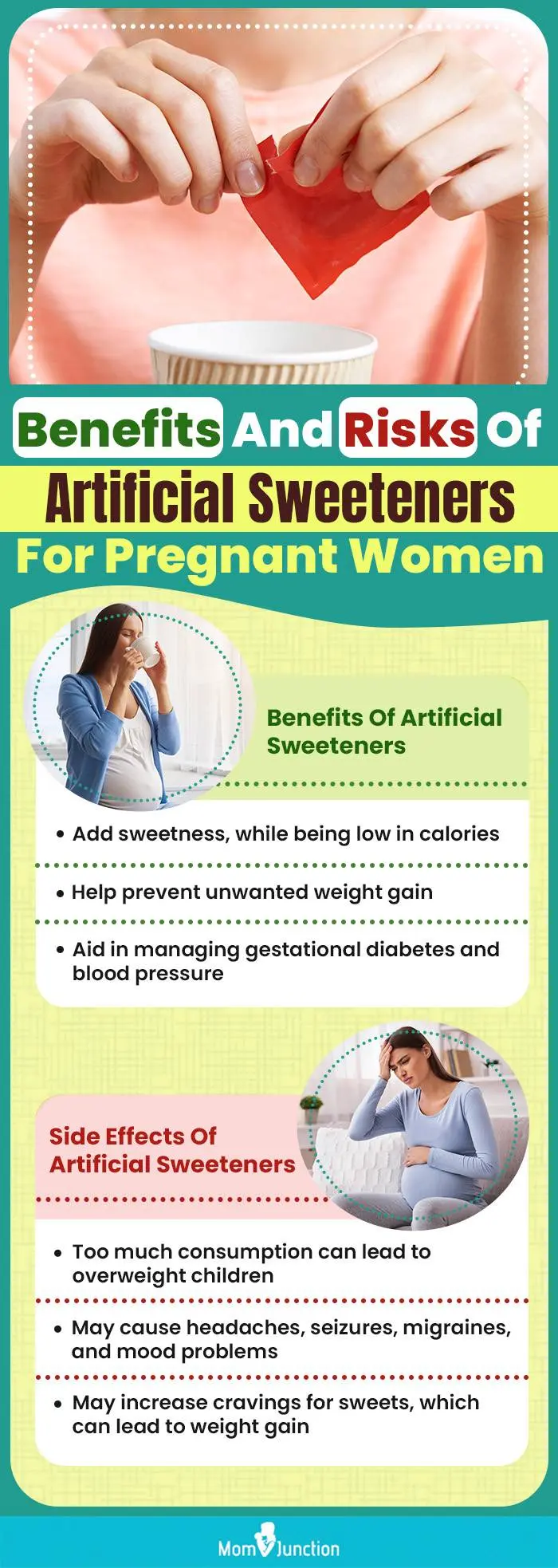
Illustration: Momjunction Design Team
Illustration: Can You Take Artificial Sweeteners During Pregnancy?

Image: Dall·E/MomJunction Design Team
References
- Sugar, Sugar Substitutes, and Artificial Sweeteners.
https://www.chp.edu/our-services/endocrinology/resources/sweetners - High-Intensity Sweeteners
https://www.fda.gov/food/food-additives-petitions/high-intensity-sweeteners - Eliza Pope et al.; (2014); Sugar substitutes during pregnancy.
https://www.ncbi.nlm.nih.gov/pmc/articles/PMC4229159/ - Sweeteners.
http://diabetesteachingcenter.ucsf.edu/ - Key Nutrient Sugar.
https://apps.sd.gov/PH18Publications/secure/Publications/sugar.pdf - Gestational Diabetes Nutrition.
https://diabetes.ufl.edu/outreach/resources/nutrition/gestational-diabetes-nutrition/ - Phenylketonuria
https://www.nhs.uk/conditions/phenylketonuria/#:~:text=Aspartame,used%20in%20tea%20and%20coffee - Popular Sweeteners and Their Health Effects.
https://digital.wpi.edu/concern/student_works/cf95jc016?locale=en - Brian A. Burt; The use of sorbitol- and xylitol-sweetened chewing gum in caries control
https://secure.jbs.elsevierhealth.com/action/getSharedSiteSession?redirect=https%3A%2F%2Fjada.ada.org%2Farticle%2FS0002-8177(14)63863-0%2Fabstract&rc=0 - Artificial Sweeteners and Pregnancy
https://americanpregnancy.org/healthy-pregnancy/is-it-safe/artificial-sweeteners-and-pregnancy/ - Aspartame and Other Sweeteners in Food.
https://www.fda.gov/food/food-additives-petitions/aspartame-and-other-sweeteners-food - Kirtida R. Tandel; (2011); Sugar substitutes: Health controversy over perceived benefits.
https://www.ncbi.nlm.nih.gov/pmc/articles/PMC3198517/ - Arbind Kumar Choudhary and Yeong Yeh Lee; (2018); Neurophysiological symptoms and aspartame: What is the connection?
https://pubmed.ncbi.nlm.nih.gov/28198207/ - Low-Calorie Sweeteners.
https://nutritionsource.hsph.harvard.edu/healthy-drinks/artificial-sweeteners/ - Charlotte Debras et al.; (2022); Artificial sweeteners and risk of cardiovascular diseases: results from the prospective NutriNet-Santé cohort.
https://www.bmj.com/content/378/bmj-2022-071204 - Anna Palatnik et al.; (2020); Consumption of non-nutritive sweeteners during pregnancy.
https://pubmed.ncbi.nlm.nih.gov/32275895/
- Maged M. Costantine et al.; (2014); Physiologic and pharmacokinetic changes in pregnancy.
https://www.frontiersin.org/journals/pharmacology/articles/10.3389/fphar.2014.00065/full
Community Experiences
Join the conversation and become a part of our nurturing community! Share your stories, experiences, and insights to connect with fellow parents.
Read full bio of Dr. Shikha Sharma
Read full bio of Swati Patwal
Read full bio of Rebecca Malachi
Read full bio of Aneesha Amonz











